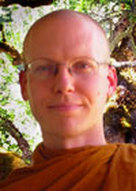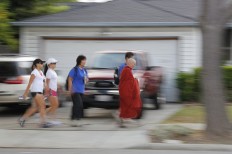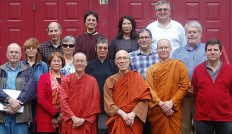[Berkeley Buddhist Monastery will be offering a series of Sunday evening classes using Dhamma with modern issues led by Ajahn Guna. It will be a blend of modern documentaries, walking meditation, discussion, reflection, and other spiritual tools such as chanting.]

Ajahn Guna
I have devoted my life to the study and practice of the teachings of the Buddha and find that if there is not a strong framework such as the Dhamma used while receiving information about current events—the mind is not peaceful or able to produce positive results. If Buddhism was not relevant to current events, then I would choose a different path! Just being an “armchair Buddhist” who has read a lot but doesn’t take the teachings into practice always looked like a boring way to go. The more clarity we can gain about the Buddha’s teaching and how it applies to our modern life, the happier we are for many reasons.
… we can develop a focus of faith as we put more energy into our modern life by choosing a truly enriching direction.
First, we can start to reduce the amount of suffering in our lives by understanding what needs to be done. Second, we can share our new wisdom and joy with others. And third, we can develop a focus of faith as we put more energy into our modern life by choosing a truly enriching direction.
Documentaries
Using multi-media doesn’t mean that this will just be some “movie night”. Usually, movies are just for entertainment and people eat junk food while allowing their minds to veg out into a fantasy world. What we want is true happiness, and this means that we need the wisdom and clarity to create that. We need calm states of mind as well. Without meditation, we won’t have the calm necessary to look deeply at the issues and see through the false stories.
Usually I have always wanted to know the truth, even when it was painful to face. I don’t say that it is easy, because I admit that there have been times I have pushed certain truths away thinking that I would somehow escape pain. Always in the end, it was best to face the truths of nature in order to see the causes which were producing negative effects. It is like getting a splinter or a piece of glass in your foot. In Thailand, monks walk barefoot on almsround as is the ancient tradition in tropical Asian countries. If a little piece of glass got under the skin, it could be very hard to see. Even though every single step hurts like the dickens, sometimes en-route there wouldn’t be an opportunity to stop to dig it out. Many forest monks know what I am talking about here. If the piece is too small or transparent, it can stay in for awhile. If you put a band-aid on it and cover it up—it will never heal. Hoping it will go away doesn’t work either. That is just a waste of time. You have to dig it out. That hurts! But once it is removed it feels sooooo good! Facing the truth can be like this too.
Or, the hero takes many lives and yet seems rewarded at the end….
Many modern movies try to entertain us by stimulating our greed, hatred, and delusion by presenting causes that don’t lead to natural effects. Some examples are the classic hero who gets shot many times but keeps performing at “super human” speeds—where in real life he would be mortally wounded and die. Or, the hero takes many lives and yet seems rewarded at the end—while in reality one would perhaps be haunted by ghosts and nightmares—driven to alcohol addiction and a series of ruined relationships—never understanding why life has gotten so bad. Many unwholesome activities are glorified, while reality is suspended in many ways which teach the viewer nothing but bad virtue and confusion. Movies become teachings for the masses, and movie stars become their gurus. It is like a religion for many, but where does it go?
The documentaries we will use are different, and merely springboards for investigation. People will be encouraged to reflect on these issues in healthy ways which mainstream society doesn’t always do. Basic and wonderful foundational teachings of the Buddha can give a container or frame for the information so that the “data overload” experience can transition to an “ah-ha!” experience. We may have to ask ourselves, “How brave do we want to be?”. Staying cozy at home in the armchair is one option. Endlessly surfing the net is another. But what else can we do? Investigation of cause and effect through the lens of Dhamma can be a rewarding alternative.
Walking Meditation

Walking in daily life
Learning walking meditation is important too. Sitting meditation is a good practice, but in our modern culture many of us are doing a lot of sitting of a different kind—in front of a glowing screens large and small. Developing awareness of the body brings us back to the basics. The more mindful we are of our body as our feet touch the ground, the more clear and happy we become. Thoughts of the past and future can drop away. Thoughts that come and go can be seen for what they are—impermanent. As we walk, we bring health to our bodies, which in modern times is more and more out of balance. Many young people with lots of energy find sitting meditation boring. Walking meditation can focus that energy in a new way, while the foundation of concentration develops. As people learn this skill, then they may find themselves spontaneously putting everything down and just walking with mindfulness without even trying. Even if we only have a 10 minute break at work or at school, it is very neat when the practice starts to happen by itself—without trying. Since we all walk so much every day, it is a great life tool to develop.
Spiritual Friends

Buddhist Global Relief 2011 General Meeting of Spiritual Friends
As we chant, reflect, discuss, and meditate with others, we have the opportunity to make spiritual friends. This group can help each other through life in a very special way. Of course, as with all meaningful relationships it doesn’t happen without effort and care. When we see a friend who needs help, then we help. If we put the effort into cultivating spiritual friendships, then when we need help—we are not alone. Spiritual friends can cheer us on, and also point-out the things most people won’t bother to tell us. If we want to progress on the path of practice, we need foundation, and spiritual friends are necessary. I hope in this new class people will take the opportunity to build such a foundation.
